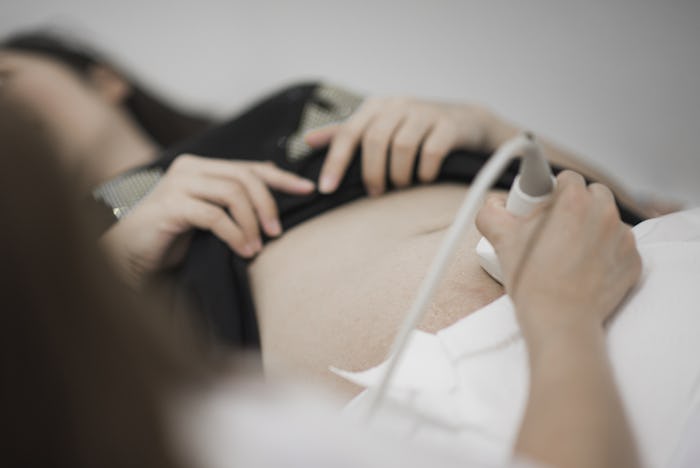Once you've taken your pregnancy test and see those positive lines, a rush of relentless questions are sure to follow. Before you know it, at least in my experience, you'll be asking those questions to doctors and friends and family members and your partner, planning for the future as best you can. Preparation is the name of the pregnancy game, and ultrasounds can help you prepare as best you can. So when is the first ultrasound of your pregnancy? While it might actually depend on a variety of factors and your specific medical history, there's a timeline you can at least refer to when trying to plan out the 40 weeks (more or less) of your pregnancy.
According to Parents, "your first ultrasound, also known as a sonogram, will take place when you're around six to eight weeks pregnant." The American Pregnancy Association (APA), however, cites that an ultrasound "may be performed at any point during pregnancy." There are different types of ultrasounds, too, and they're dependent on how far along you are and/or what your desired results from additional examinations may be. For instance, a transvaginal ultrasound is used in in the early stages of pregnancy, usually prior to that six or eight week mark, to detect and diagnose complications, such as an ectopic pregnancy, or to confirm miscarriage and/or loss of a fetal heartbeat.
During the first trimester, your doctor uses an ultrasound — which is described by The Mayo Clinic as " fetal ultrasound, or sonogram, is an imaging technique that uses high-frequency sound waves to produce images of a baby in the uterus" — to confirm a "viable" pregnancy via heartbeat, as well as to look for other early onset of abnormalities that range from a number of things.
If you go to see your doctor before that six to eight week mark, they'll likely schedule an ultrasound for later and when the fetus is large enough to be detected. Again, if there's cause for an ultrasound to happen sooner, it'll be with use of a transvaginal probe due to the size of the fetus. The Bump compares the size of your baby to a jelly bean, which is accurate. With something that small, it's no wonder your first standard ultrasound is a bit later on in your first trimester.
Your doctor may order an early ultrasound if you've experienced bleeding, if you have a history of birth defects or miscarriages, if your pregnancy has been labeled "high risk", if you are experiencing pain, or if there's any other medical cause for concern. You should be able to detect the baby's heartbeat during this visit, though if you don't hear that glorious flutter New Kids Center says it could mean you have a larger abdomen, tipped uterus, or inaccurate dating with last the period.
During your first ultrasound, your doctor should have a solid idea of your due date (calculated from your last period and your hormone levels), though you won't know the sex of the fetus until you're in your second trimester at, or around, 18-20 weeks. The ultrasound itself is painless, and, according to Parents, helps ensure everything is going the way it should at this particular point in the pregnancy.
You'll likely be told to drink plenty of water before your first ultrasound, too, and to come to the appointment with a full bladder, according to Parents. This helps your doctor examine your baby better because, again, they're tiny. All Parenting adds that the first ultrasound (when done between 8-12 weeks) is also an ideal time to determine if there are multiples.
Regardless of when your first ultrasound is scheduled, no two pregnancies are the same. If you're schedule for an early ultrasound, it doesn't mean something is necessarily "wrong." After all, pregnancy is riddled with doctor appointments. Whenever you get your ultrasound, or whatever is discovered, patience — and a sense of humor — are key. That sums up parenthood, too. Trust me.
Watch Romper's new video series, Romper's Doula Diaries:
Check out the entire Romper's Doula Diaries series and other videos on Facebook and the Bustle app across Apple TV, Roku, and Amazon Fire TV.
